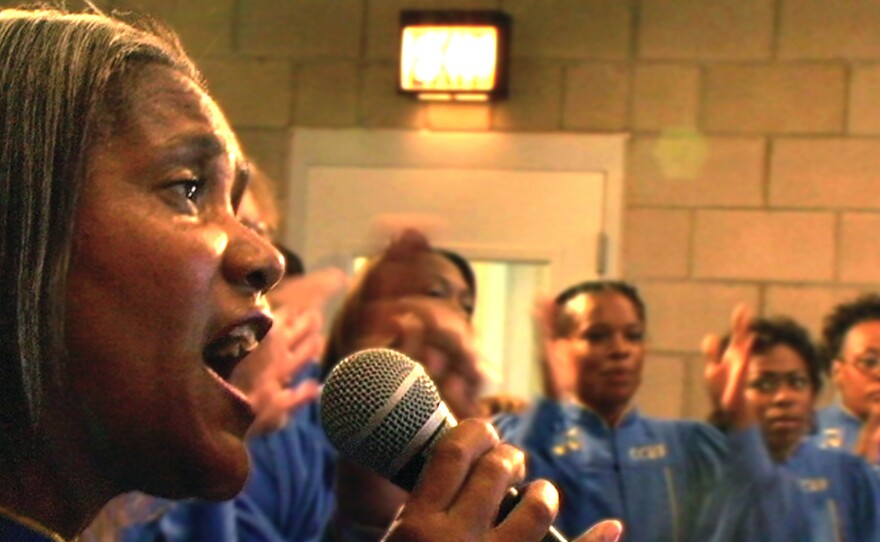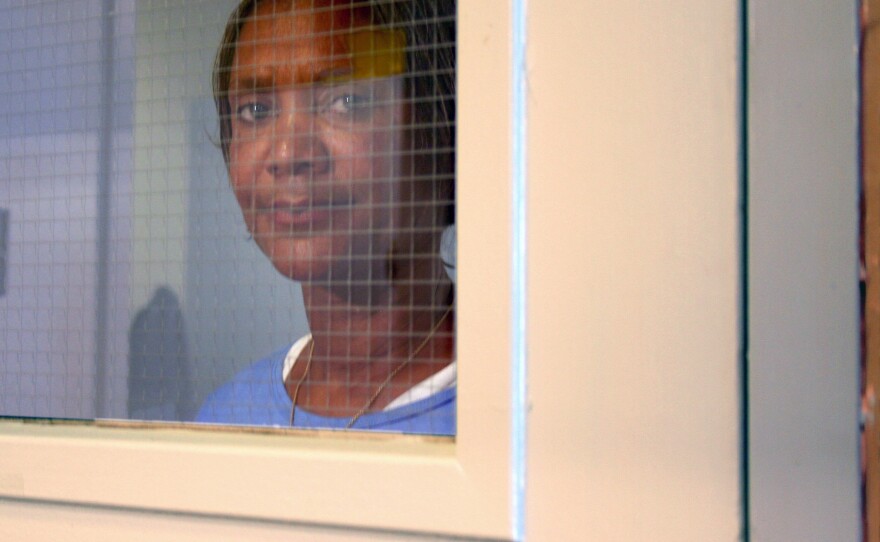"Crime After Crime" (opening August 19 at Reading Gaslamp Stadium Theaters) is documentary filmmaking with an agenda and that's a good thing. It tells the story of Debbie Peagler who was abused by her boyfriend and then the justice system.
Too often documentary is talked about within the narrow context of being an objective work of non-fiction as if objectivity is the pinnacle of what the format should strive for. But there is no such thing as complete objectivity. Once a filmmaker chooses a topic, selects the people to interview, shoots footage, and makes the first edit objectivity goes out the window. Every step of the filmmaking process introduces subjectivity because no matter how hard a filmmaker may try to be objective, he or she does have a point of view and expresses that point of view in the sound bites selected and the way shots are cut together. And that's not necessarily a bad thing. For me, documentary is less about objectivity and more about being truthful, balanced, and fair.
The new documentary "Crime After Crime" has an agenda and makes no bones about it. The film's website even has a call to action with a section called "Get Involved." That's because filmmaker Yoav Potash sees an injustice and wants to do something to correct it. This is film activism rather than mere filmmaking, and there's an energy and passion that fuels the film. The film plays out like a tense investigation in which Potash is trying to solve/retry a case and expose a social injustice. Our U.S. legal system strives to be fair and just but too often it fails and when it does it prompts the kind of outrage on display in "Crime After Crime."

The subject of the film is Debbie Peagler, an African American woman. In 1983 she was brutally abused by her boyfriend, and sentenced to 25 years-to-life for her connection to his murder. But 20 years later, a California law passed allowing incarcerated domestic-violence survivors to reopen their cases. In step pro bono attorneys, Nadia Costa and Joshua Safran, who felt that they had the evidence needed to free Peagler. But instead of freeing their client within the short frame of months that they had anticipated they find themselves in a legal and political battle that lasted years. Along the way they encounter corruption, bureaucratic red tape, and political resistance. At times their battle seems quixotic but through it all the trio remain unwavering in their commitment to challenge a flawed and failing justice system.
The film is mostly talking head but the people weave an engrossing story that incites a sense of outrage. Peagler is not painted as an entirely innocent victim. But we see the context in which she committed her crime. We are introduced to her charismatic boyfriend and then are horrified to find out that he forced her into prostitution and even beat her with a bullwhip before a pair of Peagler's acquaintances killed him. But during her trial, the evidence of her physical and sexual abuse were ignored.
Potash shows us the incarcerated Peagler as a strong, determined woman who would not give up and who used her time in jail to help others. Miraculously, she maintains a positive perspective.

Potash's respect for Peagler and his sense of activism are made clear in his statement for the press kit: "I am very proud to have the opportunity to tell Debbie Peagler’s story in my first feature-length film. She is, quite simply, a remarkable person who chose to live a positive life despite many very negative circumstances. Initially, I began production of this project simply because of my attraction to the high-stakes storyline and all three main characters: Debbie and her attorneys Joshua and Nadia. Over time, however, working on the film has transformed me into a vocal advocate for all victims of domestic violence, especially those who would otherwise be forgotten and denied justice. My goal is to create a valuable resource in sparking change for battered women in prison, and to help people to better understand and support victims of abuse. In the long term, I intend to direct more films with strong social change components in the years to come."
Like Michael Moore, Potash has an agenda but unlike Moore, Potash tries to maintain a more journalistic sense of balance and fairness. He makes his case but he does so with his dogged determination to present the facts. Moore's films are more like op ed pieces in which he goes off on a rant and then occasionally offers support for his argument. Both Potash and Moore are giving us subjective documentaries and your aesthetic taste and politics will determine if you like the films they produce.
"Crime After Crime" (unrated) played at Sundance this past January where Oprah Winfrey's OWN (Oprah Winfrey Network) purchased the film.
Go to the myKPBS Film Club for a discount coupon to use for this engagement.
Companion viewing: "After Innocence," "The Thin Blue Line," "Murder on a Sunday Morning"
And here is a recommended viewing list from the Innocence Project.






